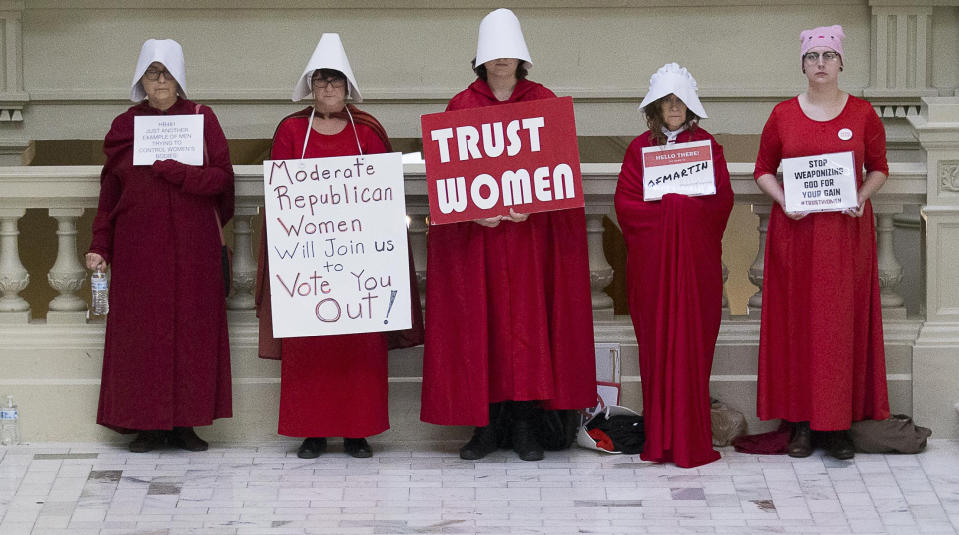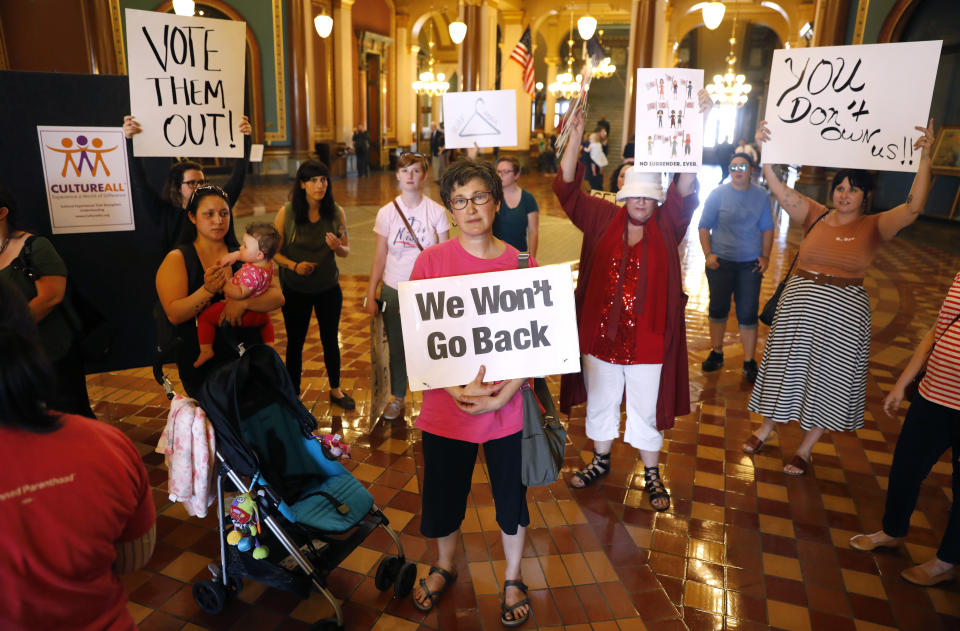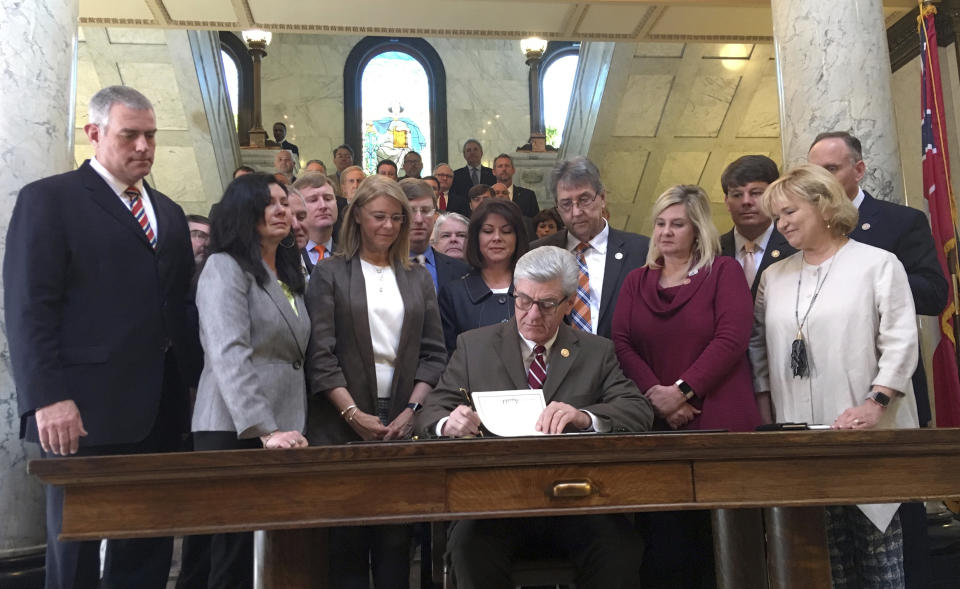6-week abortion bans are moving ahead in many states

Legislatures in more than a dozen states are considering bills that would effectively make abortion illegal, Yahoo News has found. Two states have passed such bills and been signed into law, although they are not yet in effect.
The bills vary in their details but all would outlaw abortion after six weeks, which would make it essentially unobtainable. Many women don’t even know they are pregnant at that point and, in any case, would find it difficult or impossible to arrange for the procedure before the deadline passes.
But most of the bills have another purpose: to trigger a case that could be brought to the Supreme Court and result in a ruling favorable to the anti-abortion side, which would apply to the whole nation.
Called “fetal heartbeat bills,” because technology can detect a heartbeat at about six weeks, they have been passed by legislatures in Kentucky and Mississippi in recent weeks, have moved through one house of the legislatures of Georgia, Missouri, Ohio and Tennessee, and have been introduced by legislators in Florida, Illinois, Maryland, Minnesota, New York, South Carolina and West Virginia.
The number of such bills introduced so far this year “is 63 percent higher than the number introduced in the same period the year before, which gives you a sense of how this is ramping up,” said Elizabeth Nash of the Guttmacher Institute during a conference call hosted by the Planned Parenthood Foundation of America. “This is part of an unrelenting and sustained attack on abortion rights.”
These are not the first such bills to be passed in the 46 years since the Supreme Court declared it a constitutional right to access abortion until the 24th week. A six-week ban was first signed in North Dakota in 2013 and in Iowa in 2018; both were struck down by federal courts as unconstitutional.

But since then, Justice Anthony Kennedy has retired from the Supreme Court, replaced by the more conservative Brett Kavanaugh, and anti-abortion legislators are eager to test the willingness of the new conservative majority to overturn Roe v. Wade.
Ohio state Sen. Kristina Roegner discussed that motivation directly when speaking in favor of her proposed bill before it was approved by that house earlier this month. Yes, she said, Roe v. Wade allows abortion based on the viability of a fetus, but viability is “a moving target” as new technology is developed. “We need a new standard,” she said. “The heartbeat bill provides a sensible solution.”
Below are the status of the six-week bans across the country:
KENTUCKY
After Republicans took control of the state Legislature in 2017, legislators moved almost immediately to create legislation designed to challenge Roe v. Wade.
The result was two separate laws, one that would ban all abortions in the state after six weeks, and a second that would make it illegal to end a pregnancy because of the gender, race, disability of the fetus. Republican Gov. Matt Bevin signed both on Friday, March 15, and Judge David J. Hale of the Western District of Kentucky almost immediately ordered a halt to enforcement because the laws were potentially unconstitutional.
A hearing will be held on Friday. The ACLU will be representing the EMW Women’s Surgical Center in Louisville, Ky., which is the only remaining abortion clinic in the state. (There are six states with just one clinic left.) A sign of how heated the subject has become is a warning from Hale that lawyers in the case “avoid intemperate language” in their documents.
MISSISSIPPI
Gov. Phil Bryant signed a “heartbeat bill” into law on March 21. It is due to take effect on July 1.
Like the Kentucky law, it includes exceptions if the mother’s life is in danger or at “serious risk of the substantial and irreversible impairment of a major bodily function.” It does not include exceptions for rape or incest.
Bryant has made it clear that his goal is to end abortion in the state. In his 2014 State of the State address, he said, “On this unfortunate anniversary of Roe v. Wade, my goal is to end abortion in Mississippi.”

Mississippi has passed restrictive abortion laws before. A 2018 law that would have banned the procedure after 15 weeks was struck down by a federal judge in November. That decision is expected to be heard soon by the Fifth Circuit Court of Appeals — one of 16 abortion laws making their way through the appeals courts at the moment. At the time it was passed, the Mississippi law was the most restrictive in the nation.
Mississippi too has just one remaining abortion clinic, and several groups, including the Center for Reproductive Rights, have said they will challenge the law in court on the clinic’s behalf.
OHIO
The Ohio Legislature has passed six-week bans before, but they were vetoed twice by then-Gov. John Kasich because although he was staunchly anti-abortion, he thought the bill wouldn’t stand up in court and didn’t want to hurt the cause with a defeat.
But current Gov. Mike DeWine made a campaign pledge to sign a heartbeat bill. During that race, Ohio Right to Life, which had opposed or was neutral on previous tries for the same reason as Kasich, also changed its mind and advocated a heartbeat bill
The Ohio Senate passed one on March 13 that would make performing an abortion a fifth-degree felony carrying a penalty of six to 12 months in jail and a $2,500 fine. Like Mississippi, it allows exceptions for the life and health of the mother, but not rape or incest.
The Ohio House is expected to vote in the near future. Recent polls in the state show public opinion closely divided, with 43 percent opposing the six-week ban, and 41 percent supporting it.
TENNESSEE
The Tennessee House passed House Bill 77, a fetal heartbeat bill, on March 7, by a vote of 93 to 73. The vote was taken after the Republican supermajority acted to close debate before many Democrats had a chance to speak.

The legislation now heads to the state’s Senate, where pro-choice advocates hope for a more favorable outcome in spite of the fact that 27 of the 33 members are Republican. Gov. Bill Lee has said he would sign the bill into law if it is passed.
GEORGIA
Hours after the vote in Tennessee, the Georgia House of Representatives passed its own version of a “heartbeat bill.” This one provides exceptions for the life and health of the woman, and for when the fetus is found to have a medical condition “incompatible with life.” It allows exceptions in cases of rape and incest as well — but only if the woman had reported those crimes to the police first.
In addition, it uses “personhood language” that would place the rights of the fetus above the rights of the woman carrying that fetus in the state, which opponents warn could leave women liable for prosecution not only in the case of an abortion, but also a miscarriage. In the past, women have been prosecuted under the same legal theory when they suffered an accidental miscarriage.
The bill’s sponsor, Rep. Ed Setzler, said during the debate that his bill “seeks to recognize that the child in the womb, that is living distinct from their mother, has a right to life that is worthy of legal protection.”
Some Democratic legislators, who brought coat hangers to the debate as symbols of illegal and lethal abortions of pre-Roe days, turned their backs on Setzler when he spoke.
The passage by the House was met by strong opposition from the public. Pro-choice advocates, somewhat stunned by these bills in other states, mounted a fierce public relations campaign in Georgia, and brought out a number of celebrities to condemn the bill. Nearly 100 business leaders in the state, including executives from Coca-Cola and Amazon, signed a letter opposing HB 481, saying that it would “take the state in the wrong direction.”
As a result, Setzler said in a video that some in the state Senate are having a “bellyache” that voting for the bill there could hurt their reelection chance.
Republican Gov. Brian Kemp, who pledged as a candidate to sign the toughest abortion laws in the country, endorsed the bill after its passage in the House. A Senate vote is expected by Friday.
MISSOURI
Missouri’s abortion laws were already strict, with a 72-hour waiting period and other limits that have caused the number of abortions to drop to 2,900 in 2018 from 7,414 10 years earlier.

Now the House has passed a trigger law, which would immediately outlaw abortion in the state if Roe v. Wade is overturned, as well as a six-week ban, with exceptions for medical emergencies and none for rape and incest, and felony charges for doctors, which is designed to be taken to the Supreme Court.
The measure, which includes the language “God is the author of life,” now heads to the Republican-led Senate, where a version is expected to pass, but not necessarily with all the provisions of the House version.
ARKANSAS, LOUISIANA, MISSISSIPPI, NORTH DAKOTA, SOUTH DAKOTA
All have abortion ban trigger laws, which would automatically take effect if Roe v. Wade is overturned.
FLORIDA, ILLINOIS, MARYLAND, MINNESOTA, NEW YORK, SOUTH CAROLINA, WEST VIRGINIA
“Heartbeat laws” have been proposed by legislators in each of these states, but no hearings have yet been held nor votes taken.
_____
Read more from Yahoo News:

